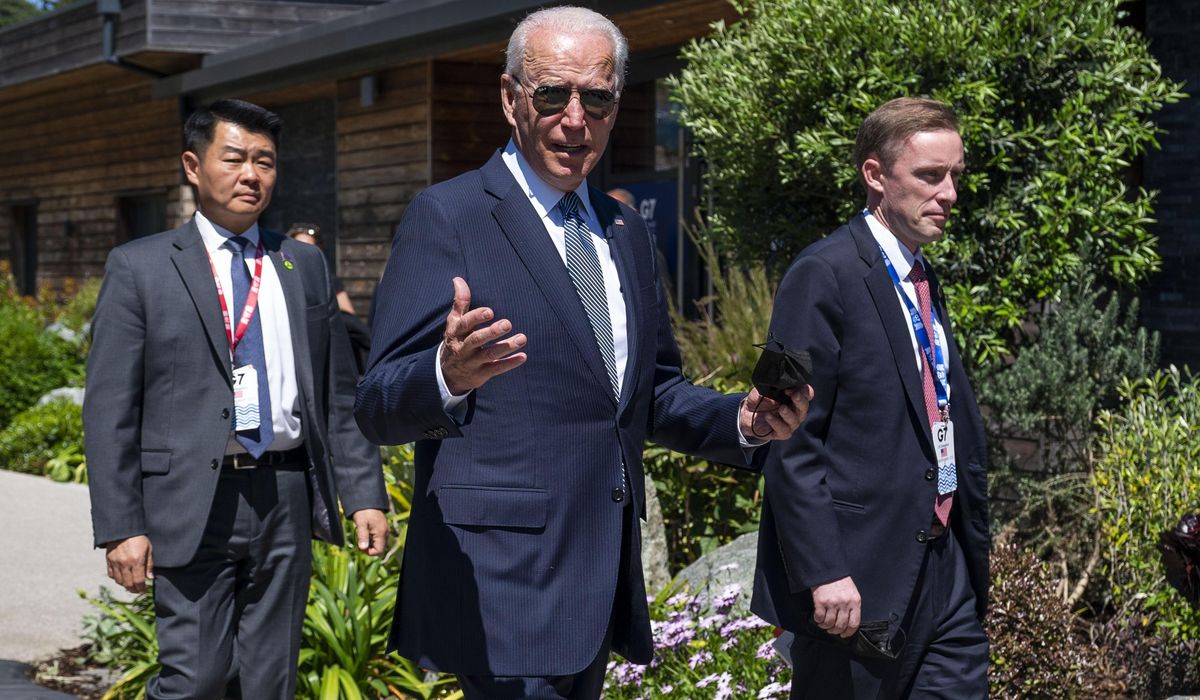

President Biden claimed breakthroughs on a number of fronts as he wrapped up his first Group of Seven summit as president on Britain’s Cornish seacoast, a gathering marked by normalcy and lower-volume diplomacy after the tumultuous Trump years.
The leaders of the seven industrial democracies endorsed Mr. Biden‘s pitch for a 15% global corporate minimum tax standard and pledged new steps to battle climate change, curb the global coal industry and supply a collective 1 billion COVID-19 vaccines to the developing world.
The G-7 powers also issued an unexpectedly pointed rebuke of China in their final communique, condemning rights abuses in Hong Kong and Xinjiang, calling out Chinese aggression in the South China Sea, criticizing Chinese trade and investment practices and endorsing a fresh, independent investigation into how the coronavirus outbreak in Wuhan, China, developed into a global pandemic.
Mr. Biden told reporters at the summit’s conclusion that the meeting was “extraordinarily collaborative and productive.”
“I felt there was genuine enthusiasm that America was back at the table,” he said.
Mr. Biden took several swipes at his predecessor in his remarks. On climate change, he said other G-7 leaders welcomed the U.S. shift from President Trump because “we had a president who said it was not a problem.”
Although G-7 members resisted some U.S. demands on confronting China, Mr. Biden said he was satisfied with the discussions about Beijing in Carbis Bay, England.
“I think there’s plenty of action on China …,” he said. “I’m satisfied.
“I think China has to start to act more responsibly when it comes to international norms, human rights and transparency.”
Battling Beijing’s ‘Belt’
Host Britain and the leaders of the U.S., Canada, France, Germany, Italy and Japan took direct aim Sunday at China’s vast Belt and Road infrastructure program for the developing world. They pledged to establish a rival financing program that is based in the private sector and, in Mr. Biden‘s words, “much more equitable.”
U.S. leaders have watched with concern as Chinese President Xi Jinping’s Belt and Road program has funneled tens of billions of dollars into underwriting roads, bridges, ports and other infrastructure projects in countries across Asia, Eastern Europe, sub-Saharan Africa and Latin America. The investments have given Beijing enormous diplomatic and financial leverage, but critics say many of the projects have proved uneconomical and have left recipients with punishing debts to Beijing and to the Chinese contractors who do much of the work.
“China has its Belt and Road Initiative, and we think that there’s a much more equitable way to provide for the needs of countries around the world,” Mr. Biden said.
Italian Prime Minister Mario Draghi, who like Mr. Biden was attending his first G-7 summit as his country’s leader, told reporters that Rome was reconsidering its 2019 decision to become a formal member of the Belt and Road network. Italy is the only G-7 country to have taken that step.
The U.S. also saw progress on the minimum tax issue as the G-7 leaders endorsed an international push to require companies to pay a minimum tax of 15% of their income, targeting a drive by multinational corporate giants such as Apple to seek out low-tax havens.
Mr. Biden said corporate rate-shopping had deprived governments of needed revenue while allowing some of the world’s biggest businesses to pay little in taxes.
The G-7 endorsement is expected to give momentum to a drive by the nearly three dozen nations in the Organization for Economic Cooperation and Development to adopt the minimum tax, though financial experts say the plan could prove difficult to implement fully. The Group of 20 nations, which includes large developing economies such as India, Brazil and China, are set to consider the minimum tax next month.
U.S. officials also hope a broad minimum tax will head off efforts by France and others to levy national digital services taxes aimed primarily at the overseas operations of American technology giants such as Apple, Facebook and Google.
Preparing for Putin
In remarks at the summit’s conclusion, Mr. Biden previewed his much-anticipated summit with Russian President Vladimir Putin on Wednesday in Switzerland after a gathering of NATO leaders Monday in Brussels.
Mr. Biden defended the decision not to have a joint press conference with the Russian leader despite multiple points of friction in the bilateral relationship, including Ukraine, human rights and U.S. charges that the Kremlin has all but condoned cyberhacking and ransomware attacks on U.S. targets by Russian actors.
Russia “has its own dilemmas” dealing with such issues as its stagnant economy, the COVID-19 crisis and its relations not just with the U.S. but with the West more generally, Mr. Biden said.
He and Mr. Putin said in separate press remarks Sunday that the two countries still had areas of cooperation.
Mr. Biden appeared to confuse his countries, though. He said one area of bilateral cooperation could be addressing the humanitarian crisis in “Libya.”
The U.S. and Russia have explored opening aid flows for the refugee crisis not in Libya but in Syria, where Russia is a major supporter of the government of President Bashar Assad.
Mr. Putin also seemed to be looking for ways to lower the temperature for the Geneva meeting. He told Rossiya-1 TV on Sunday that the summit could be a way to reestablish more normal contacts between the two leaders.
The summit is “planned to restore our personal contacts and relations, establish a direct dialogue and create really functioning mechanisms of interaction in the areas of mutual interest,” Mr. Putin said.
Speaking Sunday on CNN, Secretary of State Antony Blinken said it was unrealistic to expect a single summit to resolve all of the issues dividing the U.S. and Russia.
The summit, Mr. Blinken said, is “a beginning of testing … whether Russia is interested in a more stable and predictable relationship and finding areas to work together.
“We’re not going to get the answer out of one meeting,” he added.
